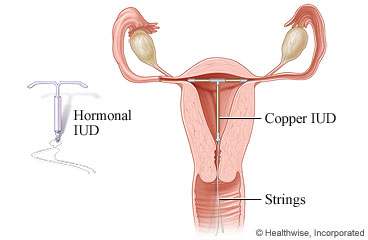
What is an intrauterine device (IUD)?
The intrauterine device (IUD) is used to prevent pregnancy. It's a small, plastic, T-shaped device. Your doctor places the IUD in your uterus. This can also be done right after you have a baby.
You have a choice between a hormonal IUD and a copper IUD.
The hormonal IUD can prevent pregnancy for 3 to 8 years, depending on which IUD is used. Talk to your doctor about how long you can use it. When you have it, you don't have to do anything else to prevent pregnancy.
The copper IUD can prevent pregnancy for 12 years. Talk to your doctor about how long you can use it. When you have it, you don't have to do anything else to prevent pregnancy.
A string tied to the end of the IUD hangs down through the opening of the uterus (called the cervix) into the vagina. You can check that the IUD is in place by feeling for the string. The IUD usually stays in the uterus until your doctor removes it.
How well does an IUD for birth control work?
IUDs are more than 99% effective for preventing pregnancy. That means every year, fewer than 1 out of 100 people who use an IUD as directed will have an unplanned pregnancy.
What are the advantages of an IUD?
- An IUD is one of the most effective methods of birth control.
- It prevents pregnancy for 3 to 12 years, depending on the type. Talk to your doctor about how long you can use it. You don't have to worry about birth control during this time.
- It's safe to use while breastfeeding.
- IUDs don't contain estrogen. So you can use an IUD if you don't want to take estrogen or can't take estrogen because you have certain health problems or concerns.
- An IUD is convenient. It is always providing birth control. You don't need to remember to take a pill or get a shot. You don't have to interrupt sex to protect against pregnancy.
- A hormonal IUD may reduce heavy bleeding and cramping.
What are the disadvantages of an IUD?
- An IUD doesn't protect against sexually transmitted infections (STIs), such as herpes or HIV/AIDS. A condom can be used to reduce your risk of getting an STI.
- A copper IUD may cause periods with more bleeding and cramping.
- You have to see a doctor to have an IUD inserted and removed.
Where can you learn more?
Go to http://www.healthwise.net/patientEd
Enter B486 in the search box to learn more about "Learning About Birth Control: Intrauterine Device (IUD)".
Current as of: April 30, 2024
Author: Ignite Healthwise, LLC Staff
Clinical Review Board
All Healthwise education is reviewed by a team that includes physicians, nurses, advanced practitioners, registered dieticians, and other healthcare professionals.

